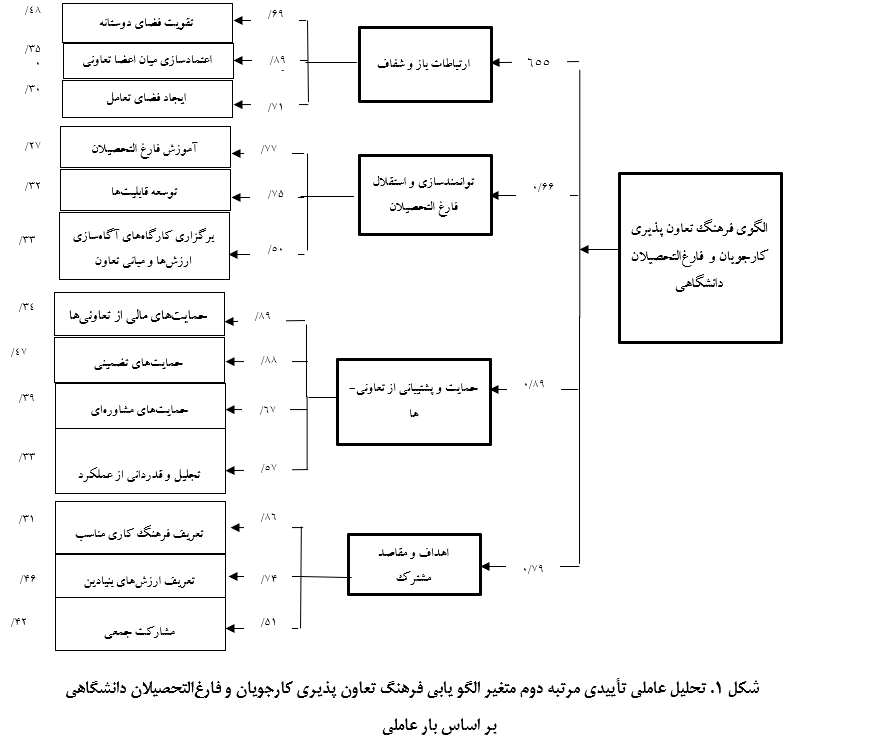Validation of the Cooperative Culture Model for Job Seekers and University Graduates
Keywords:
culture , cooperation , adaptability , Graduates , job seekersAbstract
The present study aims to validate the cooperative culture model for job seekers and university graduates. This study is applied in terms of purpose and follows a quantitative approach using a survey method. The statistical sample of the study consists of 276 individuals, including entrepreneurship students, entrepreneurship graduates, student cooperative companies, and university faculty members, who were randomly selected. The research data were collected using a questionnaire, and confirmatory factor analysis was employed for data analysis. The validity of the questionnaire was confirmed through convergent and divergent validity, and its reliability was verified using Cronbach's alpha (0.896). The model constructs were then examined using descriptive and inferential statistics through structural equation modeling (SEM) with the help of SPSS and LISREL software. According to the research findings, the Goodness of Fit Index (GFI) and the Adjusted Goodness of Fit Index (AGFI) for the dimension of open and transparent communications were 0.91 and 0.90, respectively, while the Root Mean Square Error of Approximation (RMSEA) was 0.048. For the dimension of empowerment and independence of graduates, the GFI and AGFI values were 0.91 and 0.90, respectively, with an RMSEA of 0.047. For the dimension of support and backing for cooperatives, the GFI and AGFI values were 0.91 and 0.90, respectively, and the RMSEA was 0.049. For the dimension of common goals and objectives, the GFI and AGFI values were 0.91 and 0.90, respectively, with an RMSEA of 0.049. Therefore, the results indicated that the model dimensions fit the data satisfactorily. These findings emphasize that the cooperative culture model aligns well with real-world data, and these key themes can be considered effective factors in the development and strengthening of cooperatives, as well as enhancing group collaboration among university graduates and job seekers.
Downloads
References
Liu Y. Current Status of Career Maturity of Clinical Medicine Students and Its Correlation With Professional Commitment and Emotional Intelligence. Education Reform and Development. 2024;6(2):27-32. doi: 10.26689/erd.v6i2.6458.
McDonnell M, Yang Y, Zadhasn Z. Linking Emotional and Social Competencies to Career Readiness Among Senior Undergraduates. Iranian Journal of Educational Sociology. 2024;7(1):198-204. doi: 10.61838/kman.ijes.7.1.19.
Mokhtar K. Career Transition for Special Needs Students: A Significant Systematic Literature Review. International Journal of Academic Research in Progressive Education and Development. 2024;13(1). doi: 10.6007/ijarped/v13-i1/20869.
Park I-J, Rie J, Kim HS, Park J. Effects of a Future Time Perspective–Based Career Intervention on Career Decisions. Journal of Career Development. 2018;47(1):96-110. doi: 10.1177/0894845318781043.
Peasah BSO. Role of Self Efficacy and Personality in Academic Dishonesty of Undergraduate Students: Implication for Future Careers. Asian Journal of Advanced Research and Reports. 2024;18(7):10-23. doi: 10.9734/ajarr/2024/v18i7680.
Kiakajouri D. Identifying Dimensions and Components of the Cooperative Structure in Iran with an Endowment and Charity Approach Based on Mixed Research. Journal of Endowment and Charity Studies. 2024;2(1):185-202.
Livingstone DW. The Education-Jobs Gap: Underemployment or Economic Democracy?: Routledge; 2018.
Dadras G, Aref Adib M. Cooperativism and Development. Cooperation Journal. 2004(83):61-4.
Martínez IB, Hidalgo C, Brat L. Are Cooperatives an Employment Option? A Job Preference Study of Millennial University Students. Sustainability. 2022;12(17):7210. doi: 10.3390/su12177210.
Miyamoto Y, Uchida Y, Ellsworth PC. Culture and mixed emotions: Co-occurrence of positive and negative emotions in Japan and the United States. Emotion. 2010;10:404-15. doi: 10.1037/a0018430.
Nouri M, Nouri Pour M. Constructs Influencing the Acceptance of Cooperation and Teamwork in Boyer-Ahmad County: Presenting an Expanded Model of the Theories of Reasoned Action and Planned Behavior. Iranian Journal of Agricultural Extension and Education Sciences. 2014;10(1):54-79.
Rahimi H, Mohammadi A, Haghighian M. A Sociological Explanation of the Relationship Between Member Participation and the Success of Agricultural Cooperatives (Case Study: Agricultural Cooperatives in Lorestan Province). Quarterly Journal of Rural Research. 2021;12(2):389-403.
Seyed Naqavi MA, Dehghanian H, Amiri M, Paknahad H. A Proposed Model of Trust-Based Cooperation in Consumer Cooperatives. Quarterly Journal of Cooperation and Agriculture. 2020;9(35):155-79.
Paknahad H, Dehghanian H, Seyed Naqavi A, Amiri M. Analysis and Prioritization of Trust-Based Cooperation Indicators in the Cooperative Sector. Cooperation and Agriculture. 2023;12(45):105-17.
Khajehzadeh Fehriji A, editor Presenting Methods for Fostering Creativity, Teamwork Culture, and Enhancing the Spirit of Cooperation Among Students in Kerman Province. First International Conference on Psychology, Social Sciences, Educational Sciences, and Philosophy; 2023; Babol.
Jafari AH, editor The Relationship Between Culture and Cooperation in Society. 13th National Conference on Urban Planning, Architecture, Civil Engineering, and Environment; 2021; Shirvan.
Kouhi K. Strategies for Promoting the Culture of Cooperation. Quarterly Journal of Cooperation. 2009;20(202):1-18.

Downloads
Published
Submitted
Revised
Accepted
Issue
Section
License
Copyright (c) 2025 Saeed Delfekar (Author); Yahya dadash karimi (Corresponding author); Farhad Nejad Haji Irani (Author)

This work is licensed under a Creative Commons Attribution-NonCommercial 4.0 International License.










